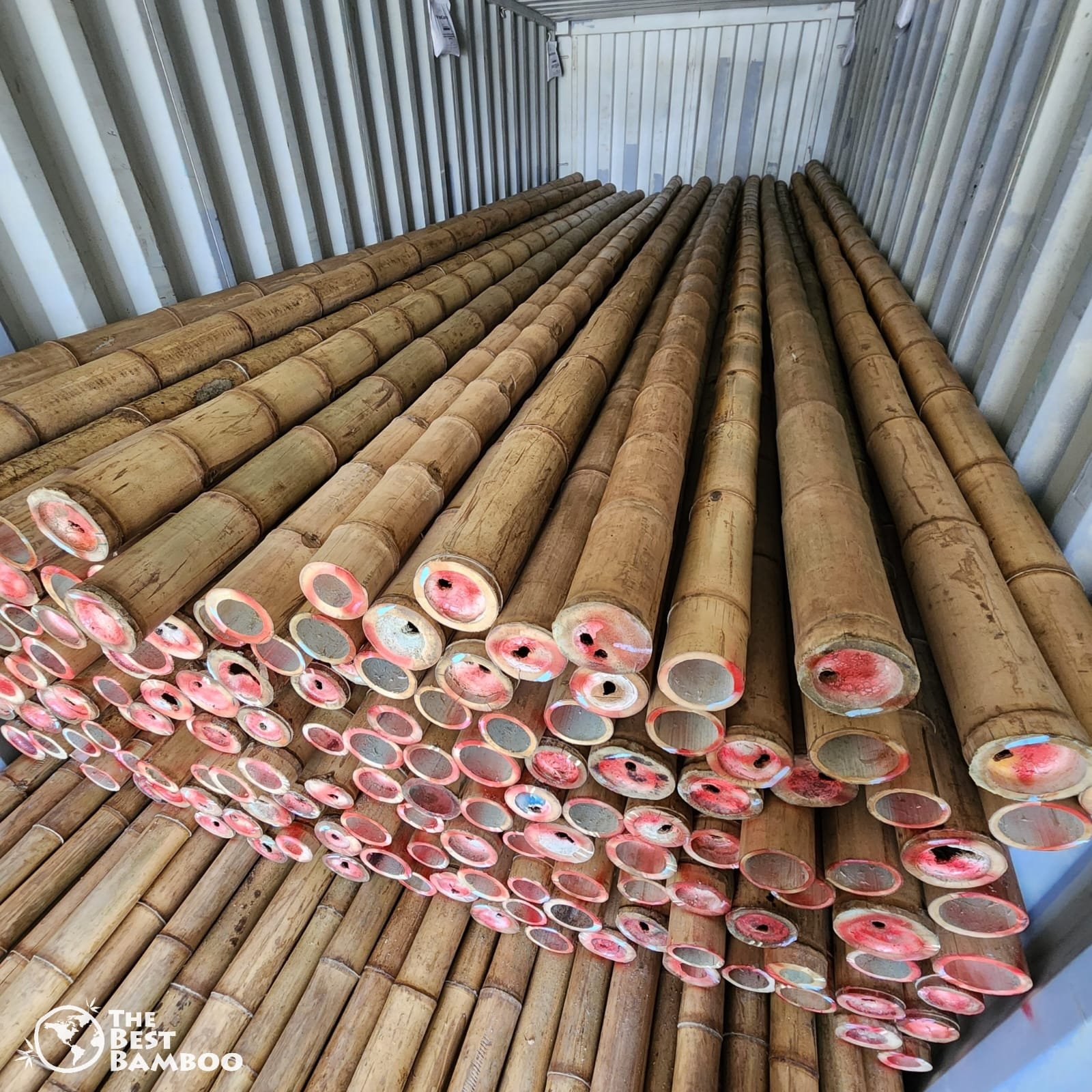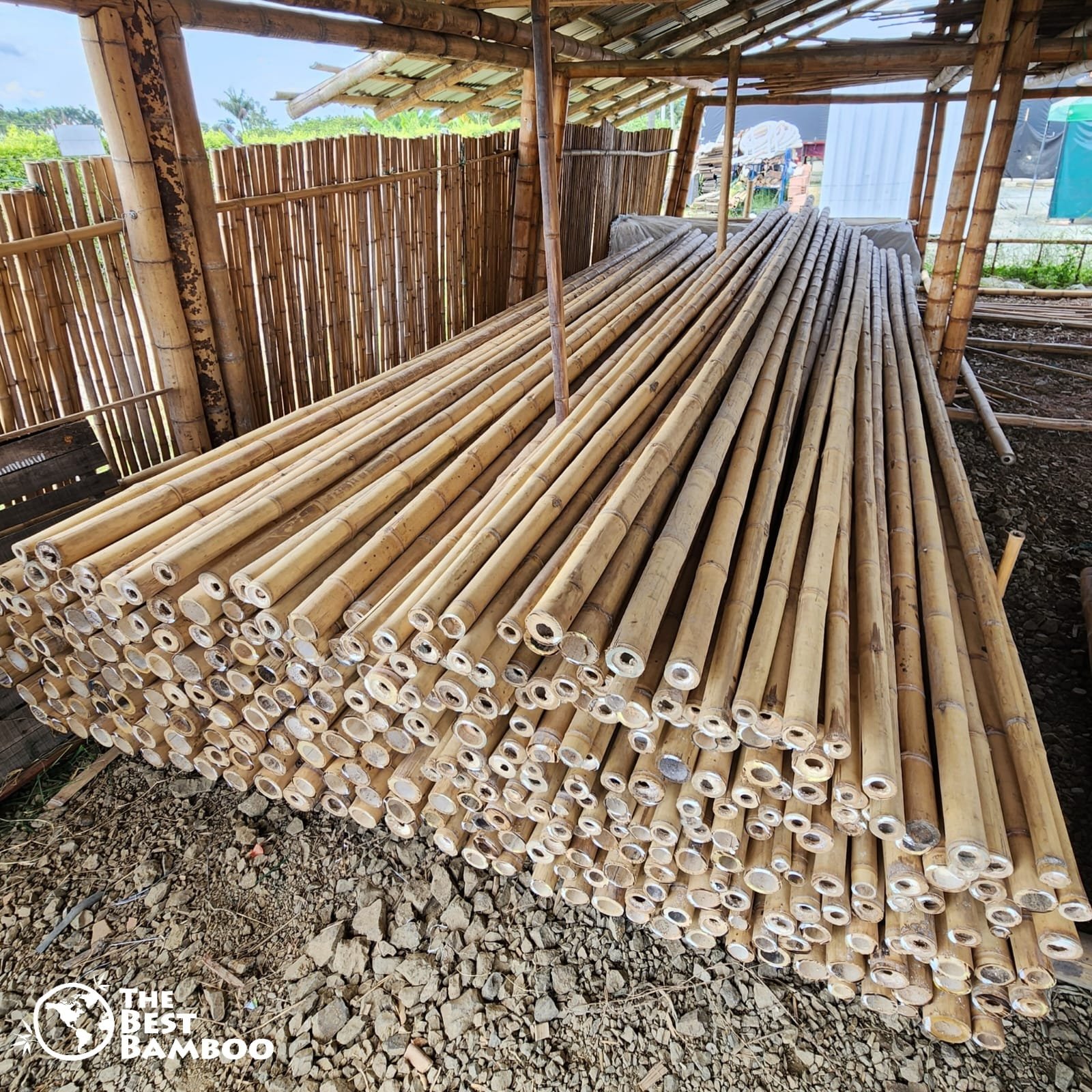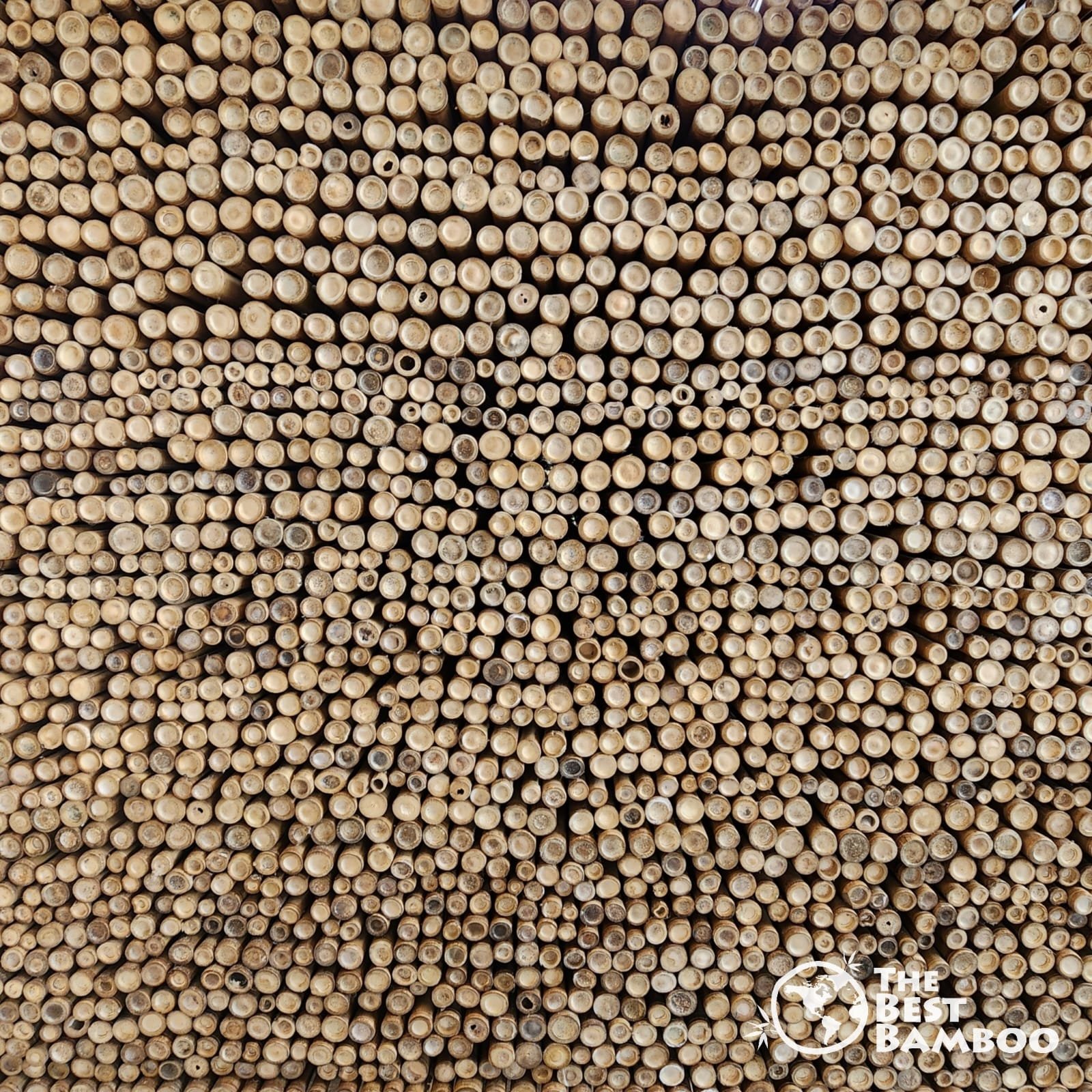Bamboo Poles for Sale: Premium Quality, Treated & Dried for Durability
Grade A Guadua Bamboo Pole
High-Quality Bamboo Poles – Custom Sizes & Fast Shipping
Looking for bamboo poles for your next project? We provide top-quality, treated bamboo poles for retail orders across the USA! Whether you need a single pole or bulk orders, we offer custom diameters and lengths, from a single inch to several feet long, to fit your exact needs.
Why Choose Our Bamboo Poles?
Top-Quality Bamboo – Sourced from our 30-year-old bamboo grove, ensuring strength and durability.
Custom Sizes Available – Diameters range from 2" to 7", with lengths up to 40 feet long.
Strong & Versatile – Ideal for construction, decor, furniture, and garden applications.
Sustainable & Renewable – A high-quality, eco-friendly resource with natural beauty.
Durable & Long-Lasting – High resistance to cracking, splitting, and bending.
Various Applications – Perfect for bamboo canes, fencing, poles, wall accents, and more.
Organically Grown Without Harmful Chemicals - Yes, our bamboo poles are grown organically—completely free from harsh pesticides and chemical fertilizers. We rely on natural cultivation methods that protect the integrity of the bamboo while maintaining a safe, eco-friendly process from grove to your project. This commitment ensures not only the durability and beauty of our bamboo, but also promotes a healthier environment for both growers and the planet.
What Makes Our Bamboo Poles Unique?
Our bamboo poles are carefully harvested, treated, and dried to ensure top quality before being exported to our US distributors. Each pole is cured and treated with a sodium borate solution to prevent insect damage and fungus growth. Weather permitting, they undergo a natural drying process to achieve their golden hue before being kiln-dried and stored properly for shipment.
Applications of Bamboo Poles
Decorative & Functional Use – Perfect for interior and exterior decor.
Bamboo Canes & Fencing – Use for privacy screens, trellises, and garden structures.
Furniture & Crafts – Create custom furniture, art installations, and DIY projects.
Construction Use – Known for high tensile strength, comparable to mild steel.
Versatile Design – Ideal for decorative items, wall accents, and bamboo art.
Bamboo Screens & Wall Accents – Add an organic, natural beauty to your space.
Split Bamboo & Custom Orders – Available upon request for flexible applications.
Half-Round Bamboo Poles: Unique Edging and Wall Options - Half-round bamboo poles are precisely what they sound like—bamboo culms that have been split lengthwise to create a flat back with a rounded front. This makes them incredibly versatile for a range of decorative and functional applications.
Many customers use half-round poles as elegant edging for gardens, walkways, and flower beds, adding a natural finish that's both durable and attractive. They're also a popular choice for interior wall treatments, wainscoting, and paneling, bringing a stylish organic look indoors without the bulk of full poles.
Key Features of Our Bamboo Poles
APPEARANCE: Overall golden, sandy/beige color, exhibiting slight waviness.
GRADE: Suitable for interior and exterior applications.
DURABILITY: Ideal for wet and tropical climates.
STRENGTH: Extremely strong, used in bridges, houses, and public buildings.
SUSTAINABILITY: Can be stained for custom decor options.
TREATMENT PROCESS: Treated with sodium borate for preservation and fire resistance.
TAPER & CURVE: As a natural product, slight variations may occur.
ORIGIN: Directly sourced from Colombia.
AGE: Harvested at 3-5 years for optimal strength.
DRYING PROCESS: Naturally sun-bleached and air-dried for a high-quality finish.
Bamboo Pole Sizes & Custom Orders
We offer a wide range of sizes for various applications:
Diameters: From 2 inches to 7 inches.
Lengths: From 4 feet to 40 feet long.
Custom Orders: Need larger diameters or specific sizes? We can accommodate special requests!
Everything You Need to Know About Bamboo
How Does Exposure to External Elements Affect Bamboo Poles?
When bamboo poles are left exposed to various external elements, they can undergo significant deterioration. Here's how different factors contribute to this process:
Weather Conditions
Rain and Humidity: Excess moisture can lead to the growth of mold and mildew, which weakens bamboo.
Sun Exposure: Prolonged sunlight can cause bamboo to dry out and lead to cracking or splitting.
Temperature Fluctuations
Heat and Cold: Extreme temperature variations cause expansion and contraction in bamboo fibers, leading to structural weakening.
Biological Factors
Insects and Pests: Exposure to the outdoors can make bamboo susceptible to termites and beetles that can damage its integrity.
Protective Measures
To help prevent these issues, consider applying a sealant or finishing treatment designed for bamboo. Regular maintenance and storage in a dry, shaded environment can also extend the lifespan of bamboo poles.
Additional Tips for Protecting Your Bamboo Poles
Use a Bamboo Sealer: Applying a high-quality bamboo sealer helps guard against moisture, mold, and UV damage.
Regular Cleaning: Gently clean bamboo surfaces to remove dirt, mildew, and debris that can accelerate deterioration.
Inspect Periodically: Check for early signs of cracking, discoloration, or pest activity so you can address problems promptly.
Consider Decorative Uses: If you're using bamboo for décor, such as fencing, plant supports, or interior accents, choose locations that minimize direct sun and rain exposure.
With the right care and a little attention, your bamboo poles can maintain their beauty and structural integrity for many years.
Seasonal Variation in Bamboo Moisture Content
The moisture content of bamboo poles noticeably fluctuates with seasonal changes. During the wetter months, bamboo tends to absorb additional moisture from the environment, leading to higher moisture levels. This increase in moisture can slightly alter their structure and flexibility.
As the season shifts towards drier conditions, the bamboo poles naturally lose moisture. This drying process not only impacts their moisture content but can also cause subtle changes in their dimensions, such as minor length shrinkage. Typically, this shrinkage falls within a manageable range, ensuring the structural integrity of the bamboo remains stable.
Proactively managing these variations is important for those using bamboo for construction or crafting, ensuring optimal performance regardless of the time of year.
How Can Bamboo Be Shaped and Bent After Curing?
After curing, bamboo becomes ready for shaping and bending. The trick lies in using controlled heat:
Heat Application: Begin by gently applying heat to your bamboo. A heat gun or a similar tool can be effective. This process makes the bamboo pliable and easier to work with.
Molding & Shaping: Once the bamboo is sufficiently soft, you can bend and mold it to your desired shape. Be cautious to apply even pressure to prevent cracks or breaks.
Cooling & Setting: Hold the bamboo in the desired shape while it cools down. This ensures that it retains the new form once the heat is removed.
Using these steps, you can effectively manipulate bamboo into virtually any shape you envision, perfect for crafting projects or structural applications.
What Are the Different Joinery Techniques for Connecting Bamboo?
Bamboo is an incredibly versatile material, and there are several joinery techniques used to connect bamboo pieces effectively. Here's a breakdown of some popular methods:
Lashing: This involves binding bamboo poles together using ropes or cords. It's a simple technique that offers flexibility and ease of disassembly, making it ideal for temporary structures.
Dowel Joints: In this technique, wooden or metal dowels are inserted into drilled holes in the bamboo poles. This method provides a sturdy connection and is great for creating more permanent fixtures.
Mortise and Tenon Joints: This traditional woodworking method involves carving a cavity (mortise) into one bamboo piece and a corresponding projection (tenon) on the other. Fitting the tenon into the mortise creates a strong and stable joint, commonly used in furniture making.
Each joinery method has its unique advantages and applications, allowing for creativity and flexibility in bamboo construction projects.










